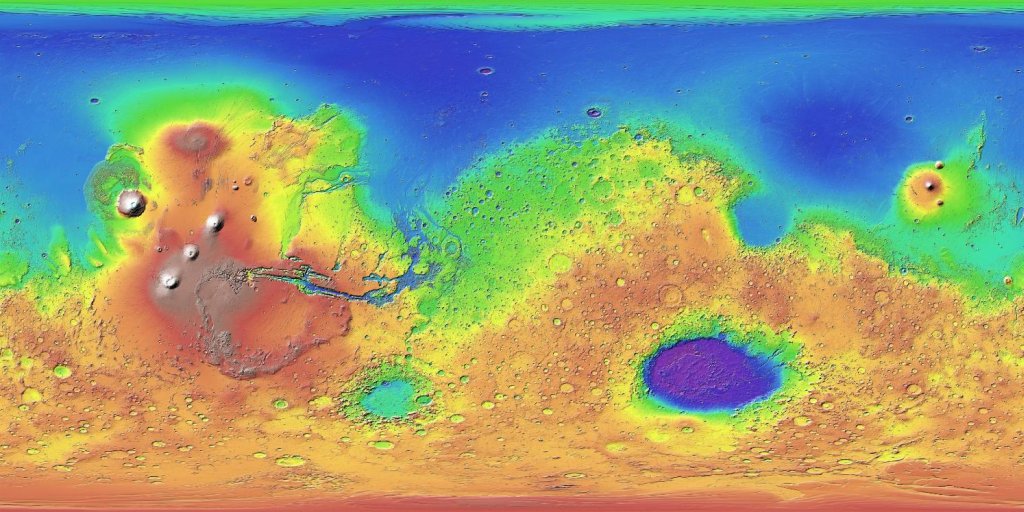
 
     |
| This deal they sent off to Mars to look for past life... (Page 1/6) |

|
sourmash
|
FEB 17, 08:24 PM
|
|
|
...it might succeed. Now, I have no doubt Mars had, and likely has, life on(within) it. In the future when they finally discover past or present life there, will we pretty much assume there's life on a large percentage of planets and bodies in space?
|
|

|
rinselberg
|
FEB 17, 10:11 PM
|
|
Don't know about that, but here's what Krispy Kreme patrons can think about for Thursday (February 18) as Wednesday becomes history.
The MARS doughnut--a one day special.
https://krispykreme.com/promos/marsdoughnut
Haven't been to one in "ages" but this has me thinking.
|
|

|
sourmash
|
FEB 17, 11:04 PM
|
|
And I thought there was nothing to do tomorrow.
But really, there's a big deal where we supposedly don't know if there's life elsewhere. But once a government announces there was, we'll instantly assume it's everywhere, even frozen on asteroids. Won't that be the shortest duration zero to 100 discovery?
|
|

|
cvxjet
|
FEB 18, 12:06 AM
|
|
Back quite a few years ago they had a Radar altimeter map created of mars- It showed the Northern hemisphere as lower (Blue colors) and the southern hemisphere higher....The Southern hemisphere had thousands of meteor craters while the northern hemisphere is (Basically) smooth.....To me, it was VERY obvious that the northern (Smooth) hemisphere at one time was an OCEAN- That is what eroded and washed away the meteor craters in that northern hemisphere....But the scientists continue to state that it is only a possibility.
They have also found erosion benches at the same altitude around the "shores" of that supposed ocean...

|
|

|
rinselberg
|
FEB 18, 12:10 AM
|
|
I don't expect it will be like that.
Mars was like Earth is now, before Earth became like Earth is now. Mars, being a smaller planet, had a core that cooled and so it lost its protective magnetic field, and that led to the loss of the Martian atmosphere and oceans.
If microbial life evolved on Mars under Earth-like conditions and then went extinct, or even persists to this day below the surface, I don't think it would change the idea of extraterrestrial life as dramatically as sourmash is suggesting. If the microbes that lived (or continue to live) on Mars are not radically different than microbial life on Earth.[This message has been edited by rinselberg (edited 02-18-2021).]
|
|

|
blackrams
|
FEB 18, 07:07 AM
|
|
| quote | Originally posted by sourmash:
...it might succeed. Now, I have no doubt Mars had, and likely has, life on(within) it. In the future when they finally discover past or present life there, will we pretty much assume there's life on a large percentage of planets and bodies in space? |
|
Never any doubt in my mind.......

Rams
|
|

|
Jonesy
|
FEB 18, 09:23 AM
|
|
| quote | Originally posted by sourmash:
...it might succeed. Now, I have no doubt Mars had, and likely has, life on(within) it. In the future when they finally discover past or present life there, will we pretty much assume there's life on a large percentage of planets and bodies in space? |
|
Statistically you could say that.. Two planets around a single star harboring life? One advanced, one likely primitive. What would be the odds of that? Apply that to the universe as a whole, and you would think life would be everywhere.
Or could our solar system still be a freak fluke? That happened potentially twice?
I believe there is life blooming all over the place in the universe. But things in the universe are spread so far apart, the chances of us ever finding, let alone contacting other life is extremely low.. Unless, again, we find it within our own solar system.
Statistically speaking of course.
|
|

|
cvxjet
|
FEB 18, 12:14 PM
|
|
| quote | Originally posted by blackrams:
Never any doubt in my mind.......

Rams |
|
My favorite Cartoon! (That quote plays on another (Live action) TV show) Marvin's voice is the only one I can perfectly imitate.
And Jonesy, I believe that the only way you get a good >Livable< planet is with a super-size moon like ours; It keeps the inside of the planet molten longer (So outgasing to keep the atmosphere up)...but also it pulls off some of the atmosphere....Thereby keeping a good balance of gases....
|
|

|
82-T/A [At Work]
|
FEB 18, 12:24 PM
|
|
For whatever my opinion is worth... I think mathematically it seems statistically implausible (like I really know what that math looks like) that Earth would be the only planet that's actually living.
Then again, it's not like the entire universe is easy to explain... lol... the whole concept of there being an infinite number of planets just boggles my mind anyway.
Finding life on another planet would be pretty exciting... no matter what that life looks like.
Human beings are generally very lazy, but we are driven by one thing... survival. When all our needs our met, all but a select few of us become complacent. It's only when we have a common goal that we work collectively. World domination is very passe', and I think we really need to be focusing on taking over the rest of the solar system before someone else does. Lol...
|
|

|
Rickady88GT
|
FEB 18, 01:18 PM
|
|
| quote | Originally posted by rinselberg:
I don't expect it will be like that.
Mars was like Earth is now, before Earth became like Earth is now. Mars, being a smaller planet, had a core that cooled and so it lost its protective magnetic field, and that led to the loss of the Martian atmosphere and oceans.
If microbial life evolved on Mars under Earth-like conditions and then went extinct, or even persists to this day below the surface, I don't think it would change the idea of extraterrestrial life as dramatically as sourmash is suggesting. If the microbes that lived (or continue to live) on Mars are not radically different than microbial life on Earth.
|
|
Not being argumentative but what does a hot core have to do with gravity vrs a cool core? For example, the moon has gravity and compared to Earth it has a cool core.
AND why would we think Mars has cooled or is cooled?
How could asteroids have ice if a watered down planet requires a heated core to ................
|
|
    
  |
|















